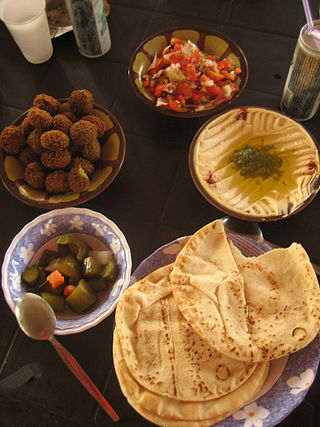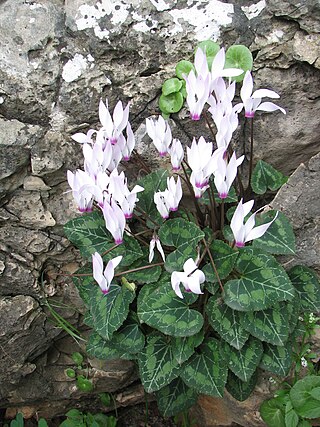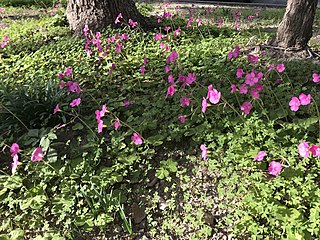
The Bedouin, Beduin, or Bedu are pastorally nomadic Arab tribes who have historically inhabited the desert regions in the Arabian Peninsula, North Africa, the Levant, and Mesopotamia. The Bedouin originated in the Syrian Desert and Arabian Desert but spread across the rest of the Arab world in West Asia and North Africa after the spread of Islam. The English word bedouin comes from the Arabic badawī, which means "desert dweller", and is traditionally contrasted with ḥāḍir, the term for sedentary people. Bedouin territory stretches from the vast deserts of North Africa to the rocky sands of the Middle East. They are traditionally divided into tribes, or clans, and historically share a common culture of herding camels and goats. The vast majority of Bedouins adhere to Islam, although there are some fewer numbers of Christian Bedouins present in the Fertile Crescent.

A woodland is, in the broad sense, land covered with woody plants, or in a narrow sense, synonymous with wood, a low-density forest forming open habitats with plenty of sunlight and limited shade. Some savannas may also be woodlands, such as savanna woodland, where trees and shrubs form a light canopy.

The Negev or Negeb is a desert and semidesert region of southern Israel. The region's largest city and administrative capital is Beersheba, in the north. At its southern end is the Gulf of Aqaba and the resort city and port of Eilat. It contains several development towns, including Dimona, Arad and Mitzpe Ramon, as well as a number of small Bedouin towns, including Rahat and Tel Sheva and Lakiya. There are also several kibbutzim, including Revivim and Sde Boker; the latter became the home of Israel's first Prime Minister, David Ben-Gurion, after his retirement from politics.
When speaking of the music of Syria, it is important to remember that there are certain musical traditions and practices that have been present in Syria longer than others. There have been musical influences introduced into Syria through multiple eras of conquest and influences from surrounding cultures in modern-day Syria. Lying near Egypt and Israel, and connected to southern Europe by the Mediterranean, Syria became host to many distinct cultural musics through trade and route. The music present in Syria is related greatly to poetry, influenced greatly by the Bedouin nomadic tribes, the maqam system in Arabic classical music, as well as influenced greatly by the geopolitical movement and conflict in the Middle East. Syrian music generally has a singer who is accompanied by three or four instruments. The texture is usually thin but can become denser depending on the use of each instrument. Music is tightly linked to poetry in Syria.

Arabization or Arabisation is the process of growing Arab influence on non-Arab populations, causing a language shift by the latter's gradual adoption of the Arabic language and assimilation into Arab culture or the fusion of local cultures with it. Arabization took place after the Muslim conquest of the Middle East and North Africa, as well as during the Arab nationalist policies of some governments in modern Arab states toward non-Arab minorities, including Algeria, Iraq, Kuwait, and Sudan.

Peganum harmala, commonly called wild rue, Syrian rue, African rue, esfand or espand, or harmel, is a perennial, herbaceous plant, with a woody underground rootstock, of the family Nitrariaceae, usually growing in saline soils in temperate desert and Mediterranean regions. Its common English-language name came about because of a resemblance to rue. Because eating it sicken or kill livestock, it is considered a noxious weed in a number of countries. It has become an invasive species in some regions of the western United States. The plant is popular in Middle Eastern and north African folk medicine. The alkaloids contained in the plant, including the seeds, are monoamine oxidase inhibitors.

The Syrian Desert, also known as the North Arabian Desert, the Jordanian steppe, or the Badiya, is a region of desert, semi-desert and steppe covering 500,000 square kilometers of the Middle East, including parts of southern Syria, eastern Jordan, northern Saudi Arabia, and western Iraq. It accounts for 85% of the land area of Jordan and 55% of Syria. To the south it borders and merges into the Arabian Desert. The land is open, rocky or gravelly desert pavement, cut with occasional wadis.

Tetraclinis is a genus of evergreen coniferous trees in the cypress family Cupressaceae, containing only one species, Tetraclinis articulata, also known as Thuja articulata, sandarac, sandarac tree or Barbary thuja, endemic to the western Mediterranean region.
Sadad is a town in Syria, 60 kilometers (37 mi) south of Homs, and 101 kilometers (63 mi) northeast of Damascus. It had over 3,500 inhabitants in the 2004 census, the majority of whom belonged to the Syriac Orthodox Church.

Jordanian cuisine is a Middle Eastern cuisine that has the traditional style of food preparation originating from, or commonly used in, Jordan that has developed through centuries of social and political change.
Bedouin Arabic refers to a typological group of Arabic dialects historically linked to Bedouin tribes, that has spread among both nomadic and sedentary groups across the Arab World. The group of dialects originate from Arabian tribes in Najd and the Hejaz that have spread since the 10th century until modern day. Bedouin dialects vary by region and tribe, but they typically share a set of features which distinguish them from sedentary-type dialects in each region.

Cyclamen persicum, the Persian cyclamen, is a species of flowering herbaceous perennial plant growing from a tuber, native to rocky hillsides, shrubland, and woodland up to 1,200 m (3,900 ft) above sea level, from south-central Turkey to Lebanon-Syria and the Palestine region. It also grows in Algeria and Tunisia and on the Greek islands of Rhodes, Karpathos, and Crete, where it may have been introduced by monks. Cultivars of this species are the commonly seen florist's cyclamen.

Anabasis is a genus of plants in the subfamily Salsoloideae of the family Amaranthaceae. It is distributed in southern Europe, North Africa, and Asia.

Furqlus is a town in central Syria, administratively part of the Homs Governorate, east of the city of Homs. Situated at the eastern approaches of the Syrian Desert, the town is located between al-Qaryatayn to the south, Sadad to the southwest, Shinshar to the west, Fatim al-Amuq and al-Sayyid to the northwest, al-Mukharram to the north and Palmyra to the east. According to the Central Bureau of Statistics (CBS), Furqlus had a population of 5,096 in the 2004 census.

Oxalis articulata, known as pink-sorrel, pink wood sorrel, windowbox wood-sorrel, Chari amilo (Nepal),sourgrass,Netho (khatta) saag (India) is a perennial plant species in the genus Oxalis native to temperate South America. It has been introduced in Europe in gardens and is now naturalized in these areas.

The military of the Islamic State is the fighting force of the Islamic State (IS). The total force size at its peak was estimated from tens of thousands to over two hundred thousand. ISIL's armed forces grew quickly during its territorial expansion in 2014. The ISIL military, including groups incorporated into it in 2014, openly operates and controls territory in multiple cities in Libya and Nigeria. In October 2016, it conquered the city of Qandala in Puntland, Somalia. It conquered much of eastern Syria and western Iraq in 2014, territory it lost finally only in 2019. It also has had border clashes with and made incursions into Lebanon, Iran, and Jordan. ISIL-linked groups operate in Algeria, Pakistan, the Philippines, and in West Africa. In January 2015, ISIL was also confirmed to have a military presence in Afghanistan and in Yemen.
Mashriqi Arabic, or Mashriqi ʿAmmiya, encompasses the varieties of Arabic spoken in the Mashriq, including the countries of Egypt, Lebanon, Palestine, Kuwait, Jordan, Syria, Cyprus, Turkey, Iraq, Sudan, Saudi Arabia, UAE, Oman, Bahrain and Qatar. The variety is sometimes referred to as Eastern Arabic, as opposed to Western Arabic and includes Mesopotamian Arabic and Peninsular Arabic, along with Egyptian Arabic, Sudanese Arabic, and Levantine Arabic. Speakers of Mashriqi call their language ʿAmmiya, which means "common or colloquial" in Modern Standard Arabic.

Prosopis farcta, the Syrian mesquite, is a species of the genus Prosopis, growing in and around the Middle East.
Scrobipalpa gecko is a moth in the family Gelechiidae. It was described by Walsingham in 1911. It is found in Algeria, Tunisia, southern Greece and the Middle East.

Seidlitzia rosmarinus is a perennial-green desert species of saltwort in the Amaranthaceae family. It is endemic to the lower Jordan Valley along the Dead Sea, in Israel and Jordan, and in the Syrian desert, Central Iraq and in the coastal regions of Saudi Arabia, the islands of Bahrain, Qatar, and Iran, commonly known in Arabic by the names ʾušnān and šenān and in the Neo-Aramaic languages by reflexes of ʾuḥlā. It is often used by Bedouins for cleaning as a soap substitute. In medieval Arabic literature, it is also known by the names of "green ushnan" and "launderers' potash", having been used since time immemorial to produce nabulsi soap and as an electuary in compounding theriac for use in treating scorpion stings, as well as for extracting potassium for other medicinal uses.
















